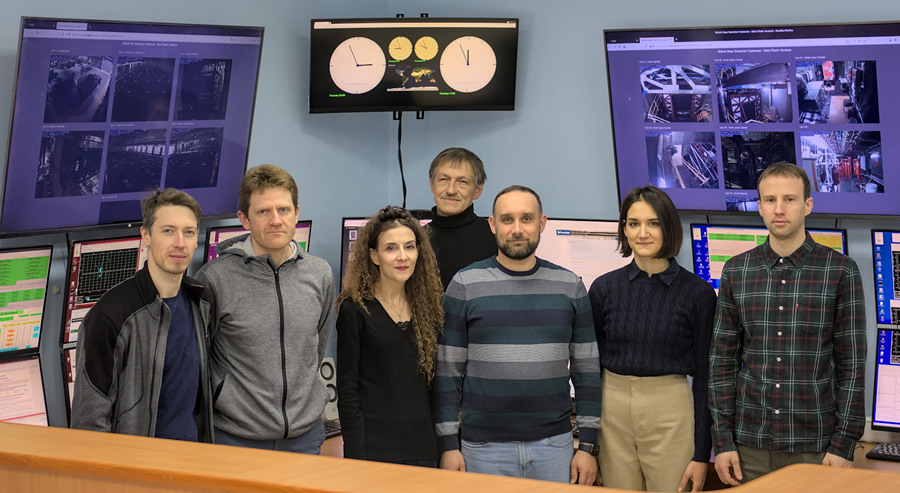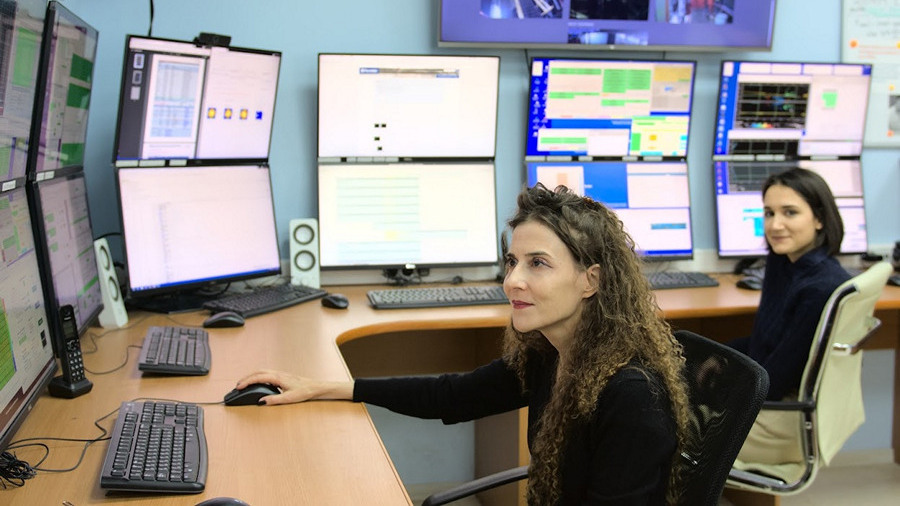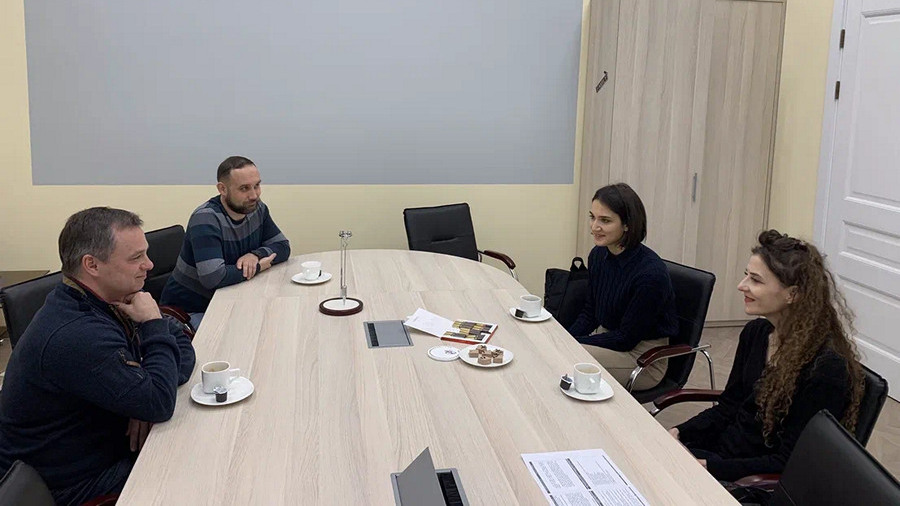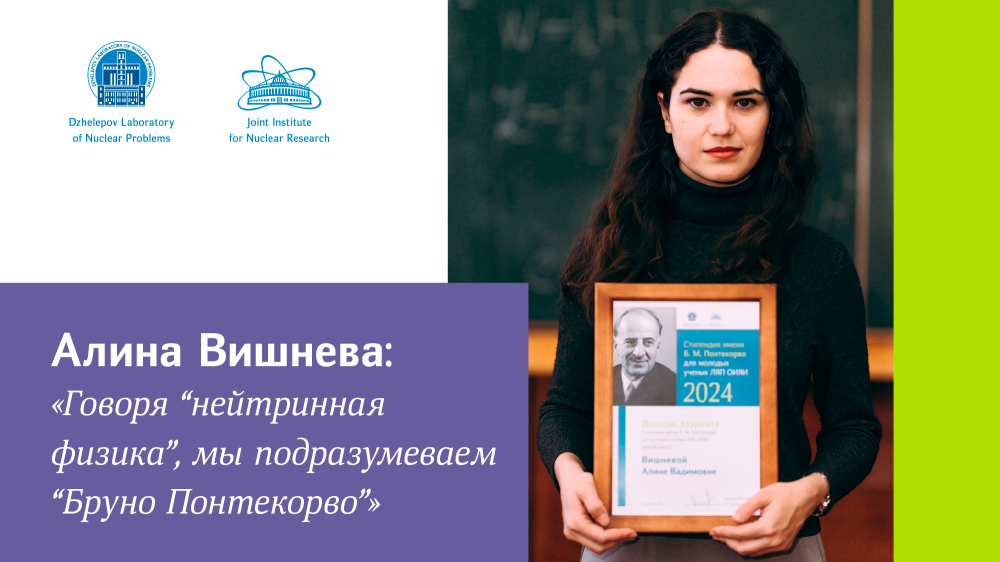Guests from the University of Belgrade
Last week, representatives from the University of Belgrade visited the Dzhelepov Laboratory of Nuclear Problems. Elena Radovanovic, a professor of the Faculty of Physical Electronics, and Milena Micic, an undergraduate student, spent four days in Dubna at the DLNP invitation. The visit was initiated by Nikolay Anfimov, the head of the Sector of Research Methodology of the DLNP Experimental Department of Particle Physics (EDPP). Tours of the DLNP subdivisions and of Dubna, meetings with the directors of JINR, DLNP, and the JINR University Centre (UC) were scheduled during the visit.

 Arseniy Rybnikov, Vladimir Kozhukalov, Elena Radovanovic, Vasily Gromov, Nikolay Anfimov, Milena Micic, Alexander Selyunin | Photo by Anastasia Malyshkina
Arseniy Rybnikov, Vladimir Kozhukalov, Elena Radovanovic, Vasily Gromov, Nikolay Anfimov, Milena Micic, Alexander Selyunin | Photo by Anastasia Malyshkina
At present, Serbia is an Associate Member of the Joint Institute for Nuclear Research. The possibility of its acceding to JINR as a full Member State is already under discussion. That is why it is important to find areas of mutual interest of scientists from Serbia and those from JINR.
The contact between DLNP and the Faculty of Physical Electronics of the University of Belgrade was established thanks to the UC online programme INTEREST (International Remote Student Training). Professor Elena Radovanovic shared with her students the inbox invitation to join the INTEREST programme. Milena Micic got interested in one of the projects of the fifth wave of this programme (project supervisor is Elena Kokoulina, LHEP) and applied for participation. Milena was involved within this project in the computer simulation of an electromagnetic calorimeter for the BM@N experiment at the NICA facility. The calorimeters of a similar design are also used in the COMPASS experiment at CERN.
Nikolay Anfimov notes, “We have an extensive programme in the DUNE neutrino experiment and are looking for new researchers to complete our tasks. The INTEREST programme is a great opportunity for getting to know our candidates better. Elena Kokoulina with whom we have been long and productively cooperating recommended me Milena Micic as a gifted student specialising in physical electronics who quickly grasped the idea of particle physics detectors. In this way, the cooperation was established.”
Milena Micic and Elena Radovanovic learned research methods used at the EDPP within the JUNO, TAO, NOvA, DUNE, and COMPASS experiments. Particularly, they visited the Dark Room where large PMTs for the JUNO experiment are tested, were shown test benches for SiPM mass testing and electronics and NOvA scintillator testing, and also the electromagnetic calorimeter of the “shashlik” type which was used in the COMPASS experiment. But the focus was on the DUNE experiment – a seminar was held, electronics for the liquid-argon light readout system of the DUNE Near Detector presented and detector manufacturing explained.
Also, Serbian colleagues visited the Remote Operation Center (ROC-Dubna) of the NOvA neutrino experiment.
Milena Micic says, “I was impressed to see a large photomultiplier of the JUNO experiment as a real thing and the electronics needed for the light readout system in the liquid-argon TPC of the DUNE Near Detector."
 Elena Radovanovic, Milena Micic | Photo by Anastasia Malyshkina
Elena Radovanovic, Milena Micic | Photo by Anastasia Malyshkina
The EDPP researcher Liudmila Kolupaeva gave a talk overviewing the history of the discovery of neutrino oscillations, neutrino experiments, and basics of neutrino physics in order to form a comprehensive understanding of why the detectors of this kind are to be designed.
At the meeting with Dmitry Naumov, a Deputy Director of the Dzhelepov Laboratory of Nuclear Problems, cooperation in experimental neutrino physics was discussed, e.g., in detector design and manufacture. Colleagues from Belgrade have great potential in this field. They can involve their students in the development of electronics and other devices – the students are specialised in this field after all.
 Dmitry Naumov, Nikolay Anfimov, Milena Micic, Elena Radovanovic | Photo by Irina Sidorova
Dmitry Naumov, Nikolay Anfimov, Milena Micic, Elena Radovanovic | Photo by Irina Sidorova
Dmitry Naumov suggested considering a possible extension of cooperation. There are other physics directions at the University of Belgrade. Students could be involved in different research areas at our Laboratory, e.g., in the Baikal neutrino experiment. Professor Elena Radovanovic agreed to give a talk and to tell DLNP researchers about prospects for cooperation with their Serbian colleagues.
Also, the meeting with Alexander Verkheev, a UC Deputy Director, took place where student training programmes initiated by the JINR University Centre were discussed.
During this visit, the guests also met the head of the Department of International Cooperation Dmitry Kamanin. He noted the importance of the cooperation of this kind for our Institute and urged the Serbian colleagues to promote collaboration with all the JINR laboratories.
Elena Radovanovic remarks, “The visit was really eventful. Surely, we would like to see more of DLNP facilities and also visit other JINR laboratories. Unfortunately, we had not enough time, and severe frost hardly facilitated our activities. That is why this time we focused on the DLNP tour and discussion of student exchange programmes. We liked the Institute a lot, and Dubna is a nice and quiet town.”
Elena Radovanovic gave a talk about the University of Belgrade, one of the best in Eastern Europe. During this talk, studies of her colleagues from Belgrade in metamaterials, quantum cascade lasers, and novel technologies to increase photocell efficiency were discussed. However, the research field of the faculty is much wider, which opens long-term prospects for cooperation with JINR.
Meanwhile, collaborative activities will continue online. Nikolay Anfimov is willing to find tasks for Milena Micic which she could complete working remotely. For instance, to analyse the results obtained by the scientists of the Sector of Research Methodology. That will help Milena to be faster engaged and to get a better insight into methods and instruments of experimental nuclear physics. Milena Micic needs this all to join the DUNE project, one of the important DLNP experiments. It is possible that Milena will come to Dubna within a UC student training programme this summer.
Nikolay Anfimov says, “I hope Milena will like collaborating with DLNP. Now, she has got a tough study schedule, but starting her master’s study, she will have enough time to get involved in our projects. I am looking for Milena coming here to work after graduating from the university and to write her PhD thesis. We are happy to establish contacts with our Serbian colleagues. We intend to further our cooperation. We are expecting other students and researchers to get interested in collaboration with DLNP. And not only from the University of Belgrade, but also, e.g., from the Vinca Institute of Nuclear Science.”






